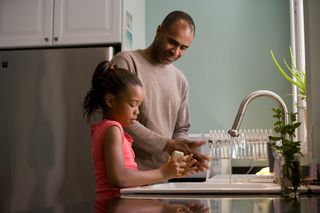Coronavirus Disease 2019
12 Ways to Effectively Parent During Crisis (Part 1)
Part 1: Let my 20 years of counseling children in crisis help you.
Posted March 15, 2020 Reviewed by Lybi Ma

As a parent, you are probably feeling a variety of emotions right now about the coronavirus pandemic — anxiety, fear, anger, burnout, confusion, and an overwhelming sense of chaos. We are in the midst of an event that many have not seen in our lifetimes. On top of that, your kids' school has just been canceled for two weeks. You may have been asked to work from home, or maybe you need to continue at your job while your kids are out of school. On top of that, you want to keep you and your kids healthy and safe. It's a lot to handle at once.
Let me share with you what works when talking with your kids about a crisis. As an American Mental Health Counselors Association Clinical Specialist in Child and Adolescent Counseling with over 20 years of experience counseling children, I have worked with kids and parents who have experienced natural disasters, war, domestic violence, terrorism, chronic illness, and other crises. There are some things you can do right now to help your children through this time.
Ask Your Kids What Questions They Have
As parents, we tend to overexplain. The old joke goes that a kid asks where they came from, while you start a big discussion about reproduction, one that you have prepared yourself for years ago. "No,' your child says, "I just want to know what city I was born in." We tend to talk to our kids in the way that we would like things explained to us. A simple, "I know there are a lot of changes going on right now, and you might have some questions. What would you like to know? I might not know some of the answers, but I will certainly try." It's perfectly okay to let your kids know that you don't know the answer to one of their questions. It is better to admit that you don't know than make up an answer. Because guaranteed, they'll eventually find the answer they're looking for, and if it doesn’t match yours, you may get more questions.
If you don’t know the answer, turn it into a fact-finding mission. Talk to your child about working together to find an answer to his or her questions. Go online to a reputable kid-friendly site and discover answers together. Check the content of the site first. Make sure it is geared towards kids and has factual information. You are teaching your kid valuable skills in seeking accurate information and using critical thinking skills.
Allow Yourself to Make Mistakes
There is no way to be a perfect parent, but there are a million ways to be a great parent. Most of us have never experienced a pandemic before, so we are making things up as we go along. Allow yourself the freedom to make mistakes. If in a moment of panic you make up the answer to your kid's question, later research the answer and let your kid know that your answer wasn’t quite right. Then go over the correct information with them. It’s okay to tell your kids that you make mistakes sometimes.
Be Prepared for Unanswerable Questions
Your kids may ask you what role God or another higher power had in the virus. Kids have asked me if their higher power was angry and caused a catastrophe as punishment. Other kids think that they did something to cause a catastrophe or blame their sibling for the catastrophe. These are very normal feelings for kids to have during a crisis. Kids are by nature egocentric beings. Kids, especially younger kids, feel that they have a lot more control over how things work in the world. This is how it is supposed to be — it’s wired into us. It’s how we make sure we let parents know we have needs that have to be met. It also helps us ease into the fact that we don’t have a lot of control over what happens in life. It’s okay to answer “I don’t know” to your kids. If it’s a spiritual question, it may be helpful to talk with your clergy about the best way to answer. Consider telling your child that sometimes things just happen, and you will do your best to protect him or her.
Acknowledge Your Kids' Fears
Let kids know it’s okay to not be okay. Tell them that it’s okay to have a lot of different feelings at once. The use of a “feeling wheel” or other charts that show facial expressions of feelings and then labels those feelings can help kids talk about what emotions they are feeling. For very young kids, draw three faces on a piece of paper — a smiley face, a face with a straight line for the mouth, and a face with a frown. Ask them which one they are feeling like today. It’s a good jumping-off point to talk about feelings, and it also is a good way for you to keep track of what your child is feeling like day-to-day.
Let your kids know that feeling sad, angry, and afraid are very normal feelings to have. Talk about how these feelings can come and go, depending on what is happening that day. If your kids ask you if you feel scared it’s okay to be honest and say, “Sometimes, but here’s how I am helping myself with those feelings….” Then talk about ways to practice stress reduction, such as deep breathing and taking a walk.
For an audio version of this entire article, featured on my Talking Brains podcast, click below.
Copyright 2020 Sarkis Media


